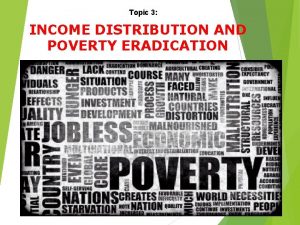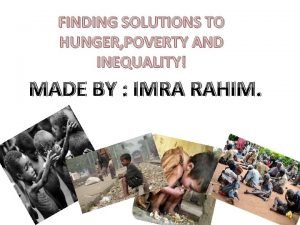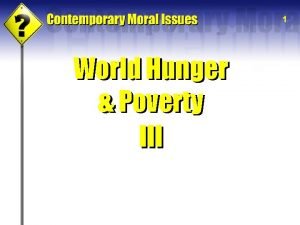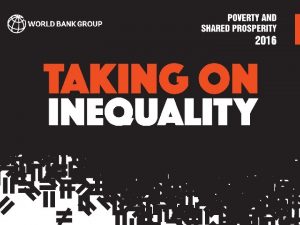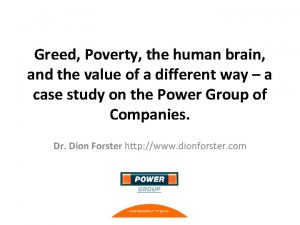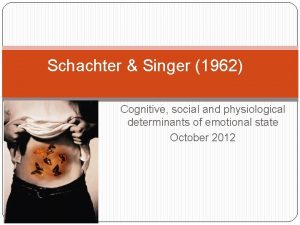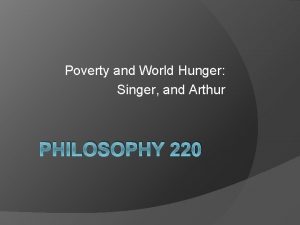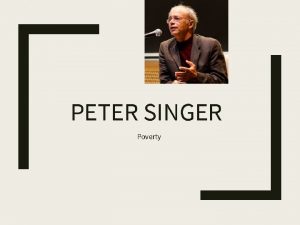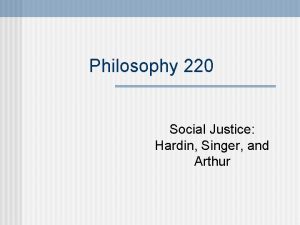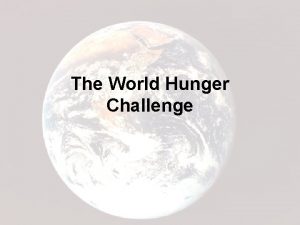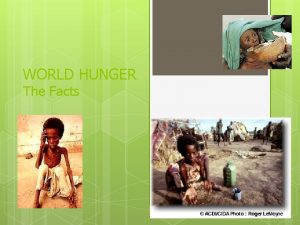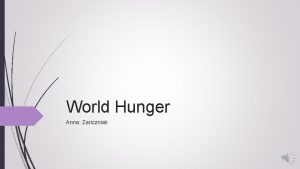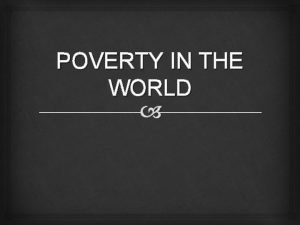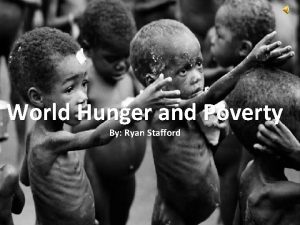Philosophy 220 Poverty and World Hunger Singer and
















- Slides: 16

Philosophy 220 Poverty and World Hunger: Singer, and Arthur

Singer, from The Life You Can Save Singer begins this excerpt with a thought experiment that he formulated many years previously: the drowning child. He reports that a similar situation actually occurred in 2007 and, mysteriously from the standpoint of our common moral intuitions, responding police officers did not jump in to save a little boy, who had jumped in to save his sister. The point of the thought experiment, when it was formulated and in the piece in front of us, is to highlight it’s proximity to the situation of the 10 million children around the world in dying every year from poverty-related causes. About 27, 000 of these children die everyday, most from easily treated or addressed causes, but the millions of us with much more than enough to care for ourselves allow this to happen.

Poverty Today Consider the reality documented by World Bank researchers, as summarized on p. 572 c 2. Poverty is not just lack of material resources. As these examples show, it is also the lack of capacity to alter meaningfully the conditions under which you live. World Bank poverty line: $1. 25/day (live on the equivalent of goods/services that could be purchased in the U. S. for that amount). In 2009, 1. 4 billion people lived under this line. Life expectancy: most developed countries = 78; least developed = >50. Child mortality: mdc = 1 in 100 before the age of 5; ldc =1 in 5. Not only do 10 million children die of poverty related causes each year, 8 million older children and adults do also.

Affluence Today Approximately 1 billion people today live in conditions of historically unparalleled affluence. For this group, life expectancy has increased by 30 years in the last century, child mortality rates have dropped by a factor of 20. Average Americans spend about 6% of their income in food. Barely 2 hours of a 40 hour work week earn us enough to feed ourselves for the week. In 2012, there are 1, 226 billionaires in the world whose combined net worth equals 7% of the total wealth of all 7 billion humans on the planet.

The Bugatti Singer offers us a second thought experiment: (575 c 1 -2). This second thought experiment was developed by another philosopher (Peter Unger) to help sharpen our thinking about sacrifice and uncertainty. Though the thought experiment is typically extreme, it is easily relatable to more mundane circumstances like saving for retirement. If the Bugatti owner should act to save the child, even if uncertain that it is necessary, the suggestion is that we should make similar sacrifices to help the 1 billion starving children, even in the face of uncertainty about effects.

The Argument (576 c 1) 1. Suffering and death from lack of food, shelter, and medical care bad. 2. “If it is in your power to prevent something bad from happening, without sacrificing anything nearly as important, it is wrong not do so” 3. It is within our power to prevent suffering and death from lack of food, shelter and medical care, without thereby sacrificing anything nearly as important. 4. So, if you aren’t doing something to prevent this suffering and death, then you are doing something wrong.

Implication There is a surprising and significant implication of this argument. Suppose my family income is $200, 000 per year and, moved by the plight of the world's poor, I give ten dollars to a global disaster relief agency such as Oxfam or Doctors without Borders. Then I think about going to the movies. But wait, I could instead donate another ten dollars to Oxfam. And another, and another. Singer's argument seems to conclude that I should continue giving this way until further giving would lead to a comparable moral sacrifice, but clearly most of us could give a substantial amount of our income (out of the remaining 94% or our wages) before such comparisons become relevant.

An Undefined Duty? Another implication of this argument is that the traditional, conventional way of drawing the line between moral duty and charity cannot be maintained. According to common moral opinion, one is morally bound not to harm others, but helping others is morally optional. If you do help others, you are going above and beyond the call of duty, and are to be commended for being charitable—doing good you were not duty-bound to do. On Singer's argument, this way of characterizing the relationship between duty and charity is turned upside down. Singer would agree with Kant that we do have a duty to be charitable, but he would go further and insist that the duty is a defined one.

Objections and Replies Pt. 1 After articulating the argument and spelling out its implications, Singer moves on to consider a number of possible objections. Some of these, like the objection from moral relativism, we’ve already seen reasons to reject. A more serious objection is tied to desserts: if people have earned the money, they have a right to spend it. As Singer notes, acknowledgement of a right is not the end of the discussion. Even a rights-based approach is going to acknowledge that rights are not moral absolutes. I may have a right to spend my money as I’d prefer, but that doesn’t mean I should always do so.

Objections and Replies Pt. 2 The third objection is that offered by Libertarianism which can be summarized as the claim that we have only negative obligations to others (to avoid harming or interfering with them. Singer rejects this claim, insisting that it is an essentially callous position. However, his response rests primarily on the observation that as a matter of fact, the 1 billion affluent people have in fact caused a great deal of harm to the 1. 4 billion impoverished, largely by consuming a disproportionate share of the world’s resources and by willingly participating in their political and economic disenfranchisement at the hands of their political leaders, who we support because it benefits us. There also significant environmental consequences of our forms of life that are borne disproportionately by the poor.

Objections and Replies Pt. 3 Don’t we already give a lot? Unfortunately, no (See Figure 13. 3, p. 580). Doesn’t the problem really need a political solution? Yes, but philanthropy and politics are not mutually exclusive. Doesn’t aid create dependency? It can, and we should be attentive to the possibility, but the risk will be often overwhelmed by the need. Won’t ‘giving until it hurts’ hurt our own finances/financial systems, ultimately making it impossible for us to give any more? Yes, but that’s not what is required. If we all gave just a portion of our disposable income, we could address all of the dire need. Don’t we naturally prefer those closest to us, and shouldn’t we help them? We do tend to show this preference, but the fact that we so, doesn’t mean that we are right in doing it (consequentialism requires impartiality). If the people in our vicinity do need our help, then we should provide it, but that doesn’t erase our responsibility to the 1. 4 billion around the globe.

Arthur, “Hunger and Obligation” Arthur criticizes Singer's conclusions in an earlier version of the argument offered in an essay entitled “Famine, Affluence and Morality. ” In this essay, Singer bases his argument on a more stringent version of the second premise from the argument above. Much of Arthur’s criticism rests on this more stringent premise (which Arthur calls “the greater moral evil rule” (586 c 1), thus somewhat limiting the force of his remarks. On Arthur’s reading, Singer’s argument is implicitly justified by reference to what Arthur identifies as a principle of Moral Equality: the poor are just as important as we are, so it would be unjust if I prefer my trivial interests to preservation of their lives.

Moral Equality? At first glance, this principle seems noncontroversial (perhaps this is why Singer never really highlights it), but Arthur argues that there is more to the question than meets the eye. What the equality principle overlooks is another important moral concept: entitlement.

Moral Entitlement According to Arthur, and in agreement with much philosophical and legal precedent, there are two kinds of entitlements: rights and desert. Entitlements of Rights: we are not obligated to heroism (e. g. , to give up, our kidneys or eyes or grant sexual favors to save someone else's life or sanity (587 c 1)). Strangers have only negative rights (rights of non-interference), unless we have volunteered for it. Entitlements of Desert: we have a right to what we deserve (both positive and negative) based on the past. Story of the industrious and lazy farmers (587 -88).

Balance Our moral system already gives weight to both future and past, consequences and entitlements. Of course we ought to help the drowning child if nothing of greater importance is at stake; but our moral thinking must take into account both consequences and entitlements. “[o]ur code expects us to help people in need as well as to respect negative and positive rights. But we are also entitled to invoke our own rights as a justification for not giving to distant strangers when the cost to us is substantial. . . ” (587 c 2). According to Arthur, Singer just completely ignores backward-looking considerations. We do have obligations to help others, but they don't overwhelm our moral entitlements (e. g. , to go to the movies).

A Correction In response to Singer, then, Arthur offers an account of the moral significance of entitlements? His account is not, as we might expect ultimately grounded in rights or desert, but rather on three more fundamental principles (588 c 1). Fairness Justice Respect In addition, Arthur argues that a moral code it is rational to accept must be practical, and he insists that his approach is more practical (and thus more rationally acceptable) than Singer’s because (591 -2): It allows for altruism and some self-interest; It doesn’t provide disincentives for self-development and economic activity; It doesn’t require people to be so rigorously impartial.
 Relative poverty
Relative poverty Poverty and hunger solutions
Poverty and hunger solutions Lead singer of jimmy eat world
Lead singer of jimmy eat world John arthur world hunger and moral obligation
John arthur world hunger and moral obligation Relative and absolute poverty
Relative and absolute poverty Poverty and juvenile delinquency
Poverty and juvenile delinquency Sandra cisneros bio
Sandra cisneros bio St john chrysostom on wealth and poverty pdf
St john chrysostom on wealth and poverty pdf Symbolic interactionism and poverty
Symbolic interactionism and poverty Ministry of housing and urban poverty alleviation
Ministry of housing and urban poverty alleviation Inequality and poverty
Inequality and poverty Greed and poverty
Greed and poverty Schachter and singer sample
Schachter and singer sample Conrat and singer experiment
Conrat and singer experiment Singer and nicolson
Singer and nicolson Schachter singer
Schachter singer Rich and poor peter singer
Rich and poor peter singer
